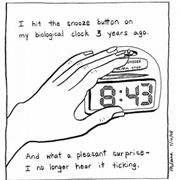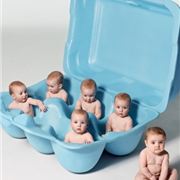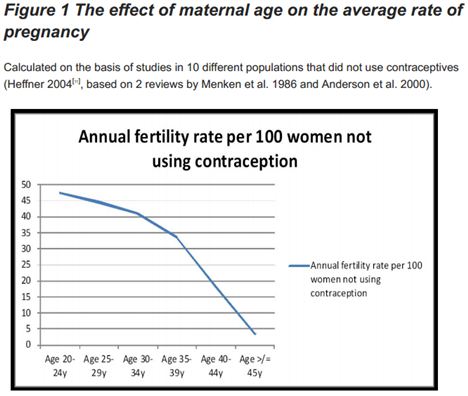WE’RE only teenagers and young adults for about a decade, but it seems a lot longer when you think about how long you’ve probably spent trying not to get pregnant.
The best time for building your career is between the ages of 25-35. Coincidentally the best time for having a baby is between the ages of 25-35.
While the media largely focuses on teenage pregnancies and first time mums at 40 plus, very little is mentioned about the rest of us. Women in our 20s and 30s faced with the inevitable decision...
 The clock is ticking...When, if ever, do I want to have a baby?
The clock is ticking...When, if ever, do I want to have a baby?
At the age of 30, and having married recently, society is already throwing the ‘b’ word at me at every possible opportunity. It’s the ‘next step’ apparently. The ‘biological clock’ is ticking. Yet like my actual alarm clock, I find myself peacefully sleeping through those same droning bells others seem to find deafening.
The truth is, I’m not alone when it comes to feeling this way.
Women are increasingly delaying motherhood in the UK with the typical age at which a British woman has her first child now about 31 compared to 24 in 1962. The number of children born to those aged 40 and over has more than quadrupled in the last three decades.
But that last statistic is of course for the lucky few forty-somethings.
Fertility in women starts to decline from about the age of 30, dropping down more steeply from the age of 35. According to the BabyCentre Medical Advisory Board, by the age of 40, only two in five of those who wish to have a baby will be able to do so.
The fact female fertility declines with age sooner and much more substantially than a man's, leaves many women around my age really considering their options, one of which is the option to freeze their eggs.
Leading consultant gynaecologist and fertility surgeon Dr Luciano Nardo will open the Centre for Reproductive Health in Daresbury Park, Cheshire in January 2014. His belief is that with the latest technology allowing egg freezing to be much more successful, it’s an option women between the ages of 21 and 40 should seriously consider.
He said: “In the modern era, with lots of women leaving it too late and having to find a solution in egg donation, it’s much better to have used this preventative approach before realising it’s too late.
“We’re now in a position to have better quality eggs being frozen due to the freezing process. Doing this in 2013 gives women a much better chance of a live birth than in the previous few years.”
 Should egg freezing be the priority?
Should egg freezing be the priority?
Of course egg freezing isn’t just for women who are yet to get the baby bug (social freezing), it’s also highly recommended for women with medical considerations such as a family history of early menopause, women with cancer due to undergo chemotherapy or radiotherapy, and those who have concerns about their ovarian reserve perhaps due to having cysts removed in the past.
Whatever the reason, the process begins with a full medical consultation followed by counselling sessions.
Dr Nardo said: “We have to be sure women are freezing their eggs for the right reasons. That’s fundamental. You can’t just bank eggs and then donate them later for commercial purposes, for example. It’s a serious process. Once a woman has frozen eggs they have to have IVF otherwise the eggs can’t be put back inside the body. Women need to understand the implications of this and be completely happy, first and foremost.”
Egg freezing begins by giving the woman drugs to stimulate her ovaries before the eggs are then collected. They won’t then continue with the process of putting the eggs with sperm until the couple has decided they are ready for a baby. From that point on it works in the same way as standard IVF treatment which you can learn about here.
Vitrification is the name for the modern day fast freezing method of freezing eggs.
Dr Nardo said: “We used to use slow freezing where the eggs went through different processes and temperatures. With fast freezing you freeze an egg like an ice cube. There is a risk eggs won’t survive but it’s now significantly lower thanks to this better technology.
“On average you need around 12 eggs to achieve a successful pregnancy. But that also depends on other characteristics being normal such as the semen sample and no underlying problems with the uterus. Not all eggs will get fertilised and not all eggs will survive.
 “We observe the eggs under the microscope. When they’re all thawed out we inject the eggs with sperm then once the embryos have been created they are put in little drops of fluid containing nutrients, proteins and amino acids to support the development of the embryos. This is when we begin to see the embryos growing. After selecting the best embryo – the one that not only looks good but has developed according to physiological parameters – the rest can then be frozen.”
“We observe the eggs under the microscope. When they’re all thawed out we inject the eggs with sperm then once the embryos have been created they are put in little drops of fluid containing nutrients, proteins and amino acids to support the development of the embryos. This is when we begin to see the embryos growing. After selecting the best embryo – the one that not only looks good but has developed according to physiological parameters – the rest can then be frozen.”
There’s also that small matter of what happens to your unused eggs – a decision which, thankfully, can only be made by the woman. The options are to discard eggs, donate them to medical research or donate them. Surprisingly Dr Nardo has never come across any woman who has decided to donate her unused eggs.
He said: “Generally they’d rather the eggs go to research than being discarded or going to others. In this country unless you have your own donor it’s very difficult to find a donor because it’s not anonymous. The child has the right to find out how he or she was conceived and it’s for that reason we have less and less donors.”
The best time for building your career is between the ages of 25-35. Coincidentally the best time for having a baby is between the ages of 25-35. Egg freezing certainly seems as though it could take the edge off what feels like mutually exclusive life goals, but it comes at a price. And we’re talking thousands of pounds.
Cost aside there’s your health to consider. Though often the source of optimism and expectation for many couples, IVF can be a very difficult emotional and physical journey that sadly doesn’t always work for everyone.
So would I freeze my eggs? I wouldn’t rule it out.
It’s not so much a lifestyle choice as knowing and understanding the options and keeping them open. Because ultimately, it’s one thing to think ‘it’s just not the right time’ and another to find out ‘I'll never have the choice’.
Follow Lynda on Twitter @lyndamoyo
 Dr NardoDr Luciano G Nardo is a Consultant in Gynaecology and Reproductive Medicine. He is a Director of Conceive International and GyneHealth (0161 834 6065 or email info@gyne-health.co.uk) - a comprehensive multidisciplinary independent sector service for women's health. He sees private patients regularly at his clinics in central Manchester, Cheshire and London, and is supported by a team of consultant colleagues, specialist nurses, counsellors, acupuncturists, reflexologists, dieticians, physiotherapists and administrative staff.
Dr NardoDr Luciano G Nardo is a Consultant in Gynaecology and Reproductive Medicine. He is a Director of Conceive International and GyneHealth (0161 834 6065 or email info@gyne-health.co.uk) - a comprehensive multidisciplinary independent sector service for women's health. He sees private patients regularly at his clinics in central Manchester, Cheshire and London, and is supported by a team of consultant colleagues, specialist nurses, counsellors, acupuncturists, reflexologists, dieticians, physiotherapists and administrative staff.
Advice from Dr Nardo about Egg Freezing
Egg Costs: “Egg freezing costs £3,500 for the treatment (not including the IVF required for the pregnancy afterward).”
Age: “Ideally you want to be older than 21 and under 40 for egg freezing. But if someone has breast cancer at 41 or 42 but good ovarian function we can still try to do it.”
Social freezing: “Remember you may not use the eggs as you may get pregnant naturally. Eggs won’t be used unless you decide to use them later. The options for unused eggs are to be discarded, donated or used for research.”
Medical freezing: “This is when you’re more likely to use your eggs. Getting pregnant however is not just dependant on eggs so freezing eggs is not a guarantee of pregnancy.”
No guarantees: “Not all women wanting to have fertility preservation are good candidates for it. Some may have poor ovarian function, in which case there’s nothing you can do.”
Cancer patients: “Some cancer patients want to preserve their eggs before chemotherapy. If the patient is in their mid 40s it’s very different to a patient in their mid 30s. Cancers that happen more commonly in young women are breast cancer and lymphoma and it’s because of the younger age range that these two types of cancer patients are probably associated with a better outcome from egg freezing.”
Risks: “As with normal IVF, egg collection and injections could induce hyper stimulation. However there are no specific risks associated with children born from frozen eggs.”
Mixed up eggs: “There is a witnessing system for everything in IVF done with tags. There was a mix up once just before the witnessing system was introduced. The mix up was in Leeds when a white couple had a black child.”
Genetic screening: “Our new clinic will be the only IVF centre outside London with a genetic centre. Genetic screening of the embryos costs £2,000 and serves to eliminate embryos affected by genetic diseases such as breast cancer BRCA 1 and 2 genes.”
Designer babies: “Using genetic screening to select sex or eye colour is not legal in the UK and I disagree with it anyway.”




